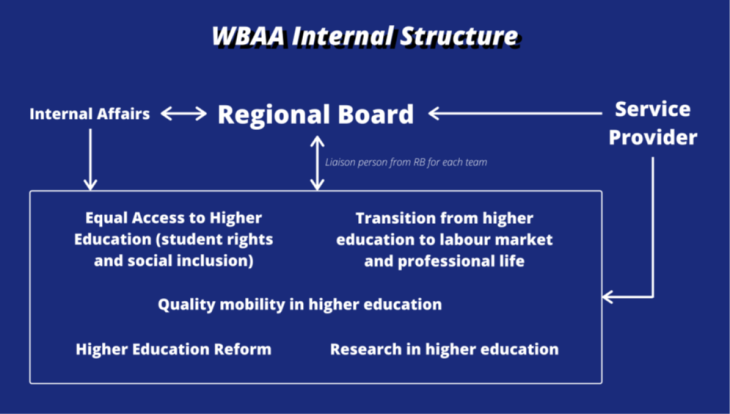WBAA 2.0: New structure for WBAA Teams - Open call for new team members!

Earlier this year, a task force consisting of Regional Board members, WBAA Team Leaders and Deputy Leaders, proposed a restructuring of the five current WBAA Teams (Academic & Career Development, Communication & IT, Research, Projects, Internal Affairs). The process of restructuring, called WBAA 2.0, aims to strengthen collaboration between members, teams, the higher education sector, and the business sector in the region to better reflect the mission and vision of WBAA. This will contribute to the motivation of the members and the visibility of WBAA in the Western Balkan region. At the General Assembly in March 2021, the members voted for the restructuring of the teams and now it is finally time for its implementation.
New Teams
The new WBAA structure will consist of five thematic teams and one support team. The provisional names are:
- Quality mobility / student exchange within higher education
- Higher education reform
- Transition from higher education to labour market and professional life
- Equal access to higher education
- Research
- Internal Affairs (support team, this team will be assembled at a later stage)
Below, in the section Portfolio of the teams, you will find more detailed information on each team.
Open call for members and schedule
We are now looking for new members for the above-mentioned teams. If you are interested in helping shape WBAA and becoming part of the new teams, you can sign up here:
https://forms.gle/DppkzwtbWNqS4PHt8
The call is open until 25 August 2021.
We will inform you in mid-September about the further process. At the end of September/beginning of October, a kick-off meeting will be held for each team facilitated by the Regional Board and Service Provider. At this meeting, the final name of the teams, the portfolio as well as the process for the team leadership will be decided. Afterwards there will be an open call for the individual team leader positions for all WBAA teams and the teams will be set up.
Team structure and management
Each thematic team will have a team leadership with the following mandate:
- Head of the team: Overall coordination of the team, liaison with the Regional Board, membership administration, facilitation of team meetings, etc.
- Vice-Head for advocacy: Responding to new developments in the team's field (e.g., new draft laws, new policies, etc.) through initiatives to governments or state institutions, press releases and emails to members to stimulate joint action.
- Vice-Head for communication: Dissemination of relevant information through WBAA social networks, writing the WBAA newsletter, promotion of the team’s initiatives and activities, promotion of advocacy actions etc.
There will be three communities in which the respective positions from the different teams will exchange information. The teams will have the liberty to adjust their internal structure as they see fit and as it fits the needs of the team best. They can, for example, create sub-team structures and assign additional roles to members and define internal rules, while keeping the core structure the same. Team leadership is responsible towards its members and the Regional Board.
The Internal Affairs team has only one team leader and, if necessary, they can decide to further design the internal structure of the team as they see fit. The Head of the Internal Affairs team is elected by consensus of the votes of the team members.
The duration of the mandate for both team types is 1 year with the possibility of extension.
The team leadership will organise at least bi-monthly meetings with the team members to discuss the current development within the team, update the situation regarding their portfolio in each chapter, share practices from different universities/chapters and propose further activities of the team. They must also keep attendance and activity records at meetings. The team leadership will meet once per month.
New members are added to the team on an ongoing basis. In addition, teams are expected to promote WBAA open calls and to be a platform for brainstorming ideas for open calls and an incubator for WBAA projects.

Portfolio of the teams
This is a rough draft of the portfolios for each team, the directions they should take. But it is left to the teams to agree on the final description of the portfolio and the final name.
1) Quality mobility / student exchange within higher education
This team is dedicated to topics such as visa issues, formal academic recognition of credits, improving the environment for student exchange, internationalisation, advocacy and enhancement of higher education cooperation, cooperation through EU-funded programmes, etc., promoting exchange programmes and the Erasmus+ programme as a driver for international mobility and experience, raising awareness of the added value of exchange programmes.
2) Higher education reform
Align higher education systems in the WB6, explore the status quo and opportunities for reform initiatives, e.g. adapting the curriculum to labour market requirements; lobby for the alignment of higher education systems in the WB6 with EU standards and the strategic frameworks of the EU, the UN and the Council of Europe, advocate for closer cooperation between higher education institutions in the WB.
3) Transition from Higher education to labour market and professional life
Exploring the needs of fresh graduates and young professionals to help them make a smooth transition into the labour market; Promoting fair competition in the market for young people, encouraging quality internships, apprenticeships and job shadowing; Capacity building of WBAA members and young people in the region - soft skills and career skills training; Promote the benefits of the Erasmus+ Programme for the personal and professional development of young people, bridging the gap between academia and practice.
4) Equal access to Higher education
a) Student rights in WB6: benefits, duties, tasks and responsibilities of students in the region; mapping needs and addressing specific issues through advocacy and publicity campaigns; engaging WBAA members, e.g., making awareness raising videos; Advocating for the rights of students who seek a balance between education and work
b) Social inclusion in higher education: focusing on educational equity, equal opportunities
for and inclusion of marginalised groups and rights of underprivileged groups in terms of their access to quality education; Promotion of the successful social inclusion component of the Erasmus+ Programme
5) Research
Explore and propose research opportunities relevant to WBAA in collaboration with other WBAA teams; Research in collaboration with other WBAA teams and/or with other interested parties; promote research findings and recommendations; seek and advertise through WBAA network relevant research; support other research efforts within the network.
6) Internal Affairs team:
The supporting role of the team reflects in:
-Work on the definition and improvement of the WBAA rules and regulations
-Assisting the Regional Board in the interpretation of the Statutes and other documents
-Supporting the institutional memory of the organisation and development
This team will be assembled at a later stage.
Germany, Cologne
30 July 2021